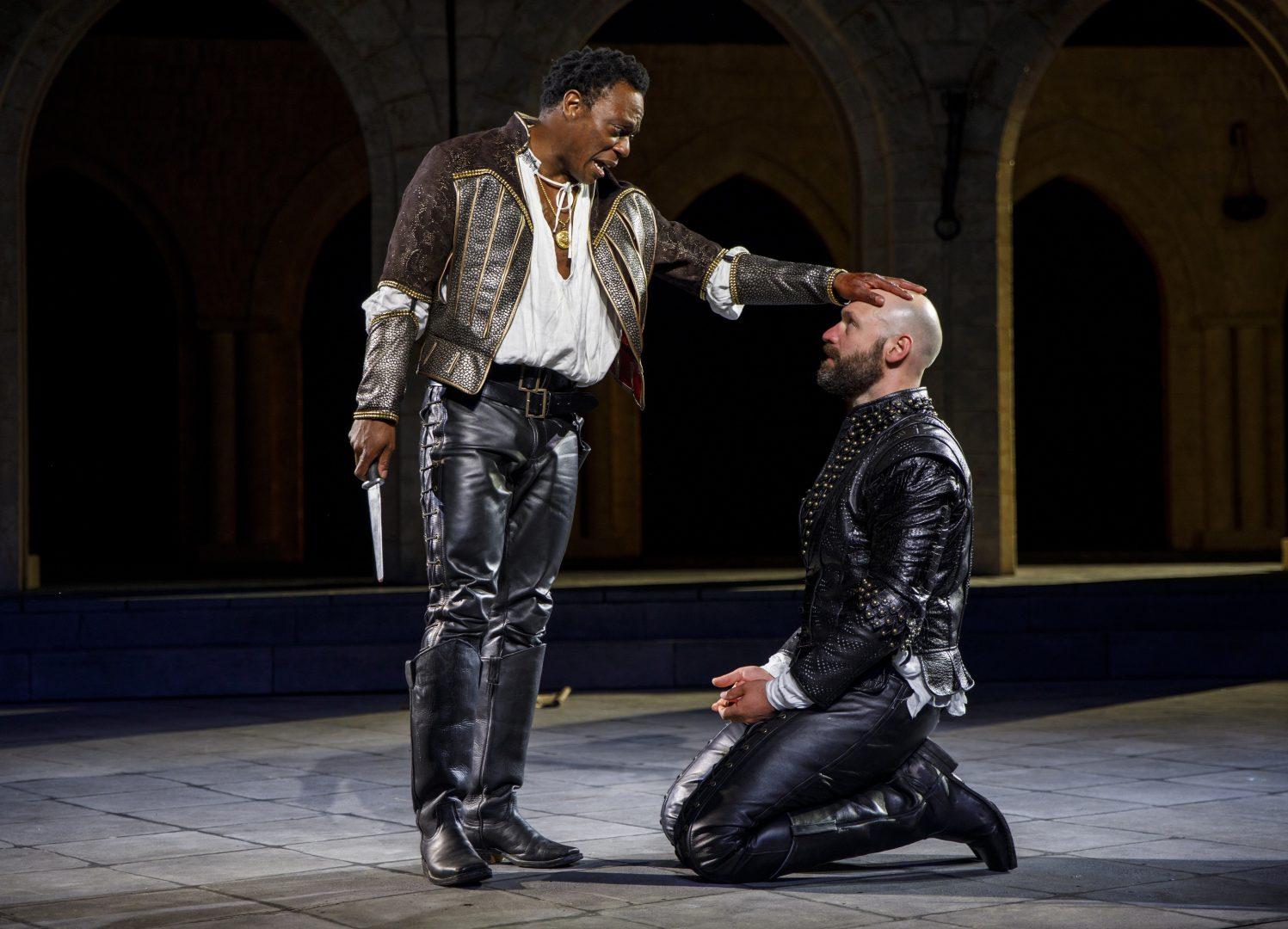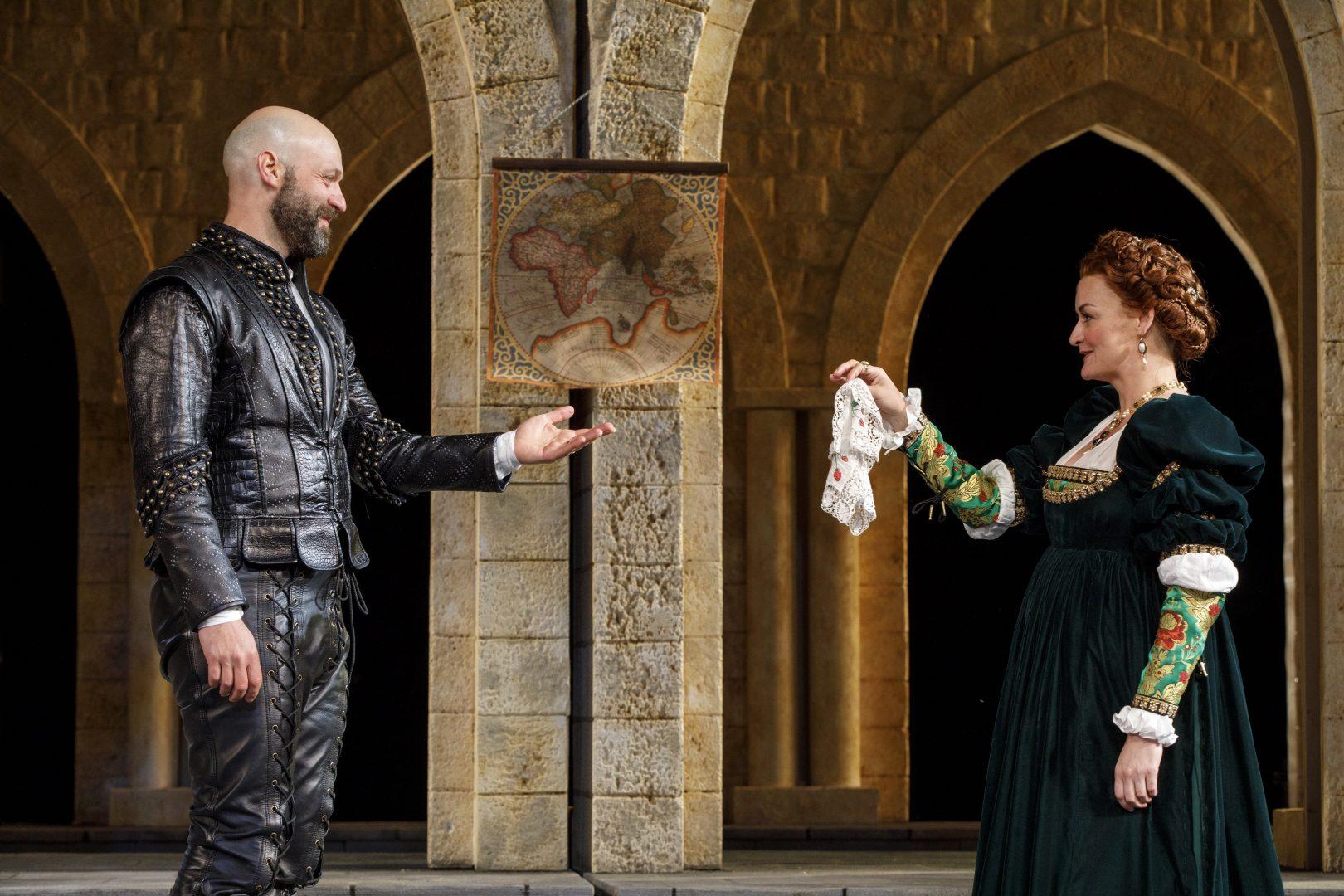Review: At the Delacorte, a Refreshingly Conventional “Othello”
Heather Lind and Chukwudi Iwuji in the Free Shakespeare in the Park production of Othello, directed by Ruben Santiago-Hudson, running at the Delacorte Theater in Central Park through June 24. (COURTESY OF JOAN MARCUS).
June 22, 2018
That Shakespearean insult “you are a Senator” fell with extra weight during last Saturday’s performance of the Public Theater’s “Othello.” The senior senator from New York, Chuck Schumer, sat in the audience that night, sloughing off the humidity of New York summer heat alongside those gathered to indulge in the time-honored tradition of free Shakespeare in the Park.
“This is the best of New York,” he said, addressing the audience before the performance. “Shakespeare in the Park! — which lets people of all different backgrounds and diversity come sit and enjoy great theater together,” Schumer exclaimed, his words noticeably falling before a show that turns on the back of a North African Venetian immigrant.
“Let us think tonight of families,” he asked, pivoting to a short stump speech about the separation of families at the border, the sun falling fast below the horizon as darkness would soon fall on Othello, moor of Venice.
But such an impromptu political preface to a play that can so easily slip into political investigation felt, in hindsight, a little sour, because the Public’s new production of “Othello” at the Delacorte Theater, directed by two-time Tony winning actor Ruben Santiago-Hudson, seeks not to muddy itself in the contemporary political trenches easily voiced in the only Shakespearean play led by a black protagonist.
Instead (and rather surprisingly), the Public has offered a classic, straightforward, traditional and unambiguous production that searches for meaning at the most basic root of this long-admired work, that looks to find clarity amidst the summer heat in the simple passions at the heart of “Othello.”
The glorious period costuming, the uncomplicated, stationary and fresco-inspired set, the traditional staging and natural lighting all breathe customary, indulgent Shakespeare.

One might expect that Santiago-Hudson could abuse the political moment to probe the unmitigated racism that sits in this play as a character itself (last year’s “Julius Caesar,” marred in Trump controversy, did not shy from a challenging, dissident interpretation), shrugging off the possibility of a classic rendition.
But Santiago-Hudson seems to have grasped something a bit more recondite. While any exploration of Shakespeare’s “Othello” must grapple with the tragic leading man’s race, an “Othello” that chooses to place the moor’s identity at the center of the production may, in paradox, take the less examined path.
Santiago-Hudson has chosen, steeping his production in a clear, traditional presentation, to ask a more complex question. Yes, Othello — who chooses to embrace the state and serve it as Army General, ironically — lives in a society steeped in evil racism. But how central, actually, is race to the progression of Othello’s love story?
In a take that chooses to embrace “Othello” as a story of tragic love first, political and racial tragedy second, Santiago-Hudson has thus afforded a refreshingly original production behind the guise of a classic presentation.
This is a play that perhaps more than any other Shakespearean work can be easily jumbled. Too heavy a focus on Iago’s controlling villainism, and the play tips heavily on the antagonist’s shoulders, Othello lost to the background. Too political an interpretation, and the love story falls apart; too avant-garde a production, and the complex plot is confused. It is perhaps Shakespeare’s most formidable, yet capricious play, and Santiago-Hudson has rooted out that the way to its contemporary heart is through classicism. Who knew?

Santiago-Hudson’s discovery is no better shown than through the actors who bring this production to life. In the open air of the Delacorte, embraced by an uncluttered interpretation, his cast is given plenty of room to breathe, ample space to fill.
He’s stocked the production with actors who know their Shakespeare well, and it’s paid off. As Othello, Chukwudi Iwuji (“King Lear”) melds perfectly into the production’s direction. To watch Iwuji contort from a confident, comfortable Othello into a pained, twisted, knotted and gnarled tragic character is a highlight of the summer. He plays brilliantly against Corey Stoll (who has appeared in Shakespeare in the Park now three summers in a row) as Iago, whose rather comic interpretation of the famous villain balances the show nicely. And as Emilia, Iago’s strong and gloriously gutsy wife, Alison Wright (“Sweat”) steals the show, toeing the line for a play in which all the power lies with the women of Venice, their men rotting around them.
Is such a straightforward, unchallenging “Othello” a missed opportunity for the Public? Maybe, maybe not. Will this production plague its audiences with profound questions for hours after the show has ended? Definitely not. But it will sing the sweet sounds of love amidst the crickets and summer arias of Central Park on a June night, set before an audience who’ve put aside time to sit in the breeze and take in some Shakespeare — and that’s all we really need.












